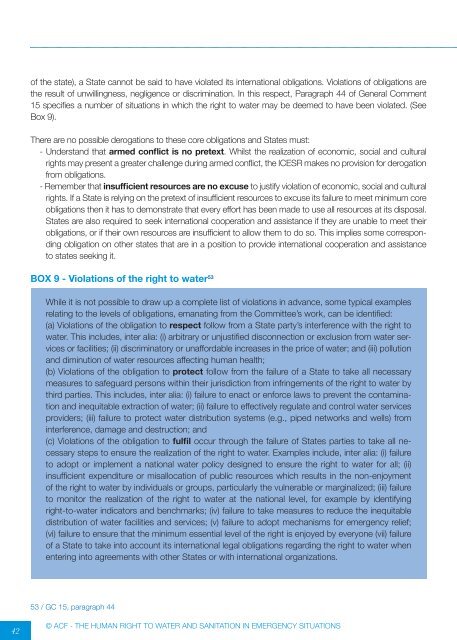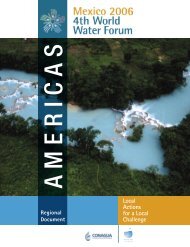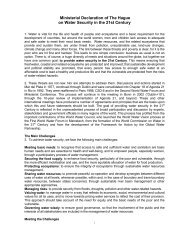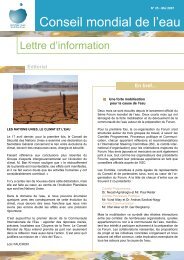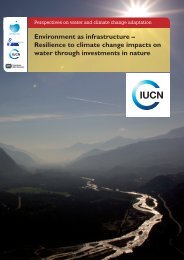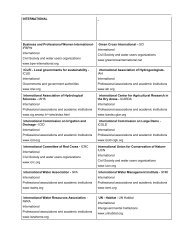the human right to water and sanitation in emergency situations
the human right to water and sanitation in emergency situations
the human right to water and sanitation in emergency situations
Create successful ePaper yourself
Turn your PDF publications into a flip-book with our unique Google optimized e-Paper software.
42<br />
of <strong>the</strong> state), a State cannot be said <strong>to</strong> have violated its <strong>in</strong>ternational obligations. Violations of obligations are<br />
<strong>the</strong> result of unwill<strong>in</strong>gness, negligence or discrim<strong>in</strong>ation. In this respect, Paragraph 44 of General Comment<br />
15 specifies a number of <strong>situations</strong> <strong>in</strong> which <strong>the</strong> <strong>right</strong> <strong>to</strong> <strong>water</strong> may be deemed <strong>to</strong> have been violated. (See<br />
Box 9).<br />
There are no possible derogations <strong>to</strong> <strong>the</strong>se core obligations <strong>and</strong> States must:<br />
- Underst<strong>and</strong> that armed conflict is no pretext. Whilst <strong>the</strong> realization of economic, social <strong>and</strong> cultural<br />
<strong>right</strong>s may present a greater challenge dur<strong>in</strong>g armed conflict, <strong>the</strong> ICESR makes no provision for derogation<br />
from obligations.<br />
- Remember that <strong>in</strong>sufficient resources are no excuse <strong>to</strong> justify violation of economic, social <strong>and</strong> cultural<br />
<strong>right</strong>s. If a State is rely<strong>in</strong>g on <strong>the</strong> pretext of <strong>in</strong>sufficient resources <strong>to</strong> excuse its failure <strong>to</strong> meet m<strong>in</strong>imum core<br />
obligations <strong>the</strong>n it has <strong>to</strong> demonstrate that every effort has been made <strong>to</strong> use all resources at its disposal.<br />
States are also required <strong>to</strong> seek <strong>in</strong>ternational cooperation <strong>and</strong> assistance if <strong>the</strong>y are unable <strong>to</strong> meet <strong>the</strong>ir<br />
obligations, or if <strong>the</strong>ir own resources are <strong>in</strong>sufficient <strong>to</strong> allow <strong>the</strong>m <strong>to</strong> do so. This implies some correspond<strong>in</strong>g<br />
obligation on o<strong>the</strong>r states that are <strong>in</strong> a position <strong>to</strong> provide <strong>in</strong>ternational cooperation <strong>and</strong> assistance<br />
<strong>to</strong> states seek<strong>in</strong>g it.<br />
BoX 9 - Violations of <strong>the</strong> <strong>right</strong> <strong>to</strong> <strong>water</strong> 53<br />
While it is not possible <strong>to</strong> draw up a complete list of violations <strong>in</strong> advance, some typical examples<br />
relat<strong>in</strong>g <strong>to</strong> <strong>the</strong> levels of obligations, emanat<strong>in</strong>g from <strong>the</strong> Committee’s work, can be identified:<br />
(a) Violations of <strong>the</strong> obligation <strong>to</strong> respect follow from a State party’s <strong>in</strong>terference with <strong>the</strong> <strong>right</strong> <strong>to</strong><br />
<strong>water</strong>. This <strong>in</strong>cludes, <strong>in</strong>ter alia: (i) arbitrary or unjustified disconnection or exclusion from <strong>water</strong> services<br />
or facilities; (ii) discrim<strong>in</strong>a<strong>to</strong>ry or unaffordable <strong>in</strong>creases <strong>in</strong> <strong>the</strong> price of <strong>water</strong>; <strong>and</strong> (iii) pollution<br />
<strong>and</strong> dim<strong>in</strong>ution of <strong>water</strong> resources affect<strong>in</strong>g <strong>human</strong> health;<br />
(b) Violations of <strong>the</strong> obligation <strong>to</strong> protect follow from <strong>the</strong> failure of a State <strong>to</strong> take all necessary<br />
measures <strong>to</strong> safeguard persons with<strong>in</strong> <strong>the</strong>ir jurisdiction from <strong>in</strong>fr<strong>in</strong>gements of <strong>the</strong> <strong>right</strong> <strong>to</strong> <strong>water</strong> by<br />
third parties. This <strong>in</strong>cludes, <strong>in</strong>ter alia: (i) failure <strong>to</strong> enact or enforce laws <strong>to</strong> prevent <strong>the</strong> contam<strong>in</strong>ation<br />
<strong>and</strong> <strong>in</strong>equitable extraction of <strong>water</strong>; (ii) failure <strong>to</strong> effectively regulate <strong>and</strong> control <strong>water</strong> services<br />
providers; (iii) failure <strong>to</strong> protect <strong>water</strong> distribution systems (e.g., piped networks <strong>and</strong> wells) from<br />
<strong>in</strong>terference, damage <strong>and</strong> destruction; <strong>and</strong><br />
(c) Violations of <strong>the</strong> obligation <strong>to</strong> fulfil occur through <strong>the</strong> failure of States parties <strong>to</strong> take all necessary<br />
steps <strong>to</strong> ensure <strong>the</strong> realization of <strong>the</strong> <strong>right</strong> <strong>to</strong> <strong>water</strong>. Examples <strong>in</strong>clude, <strong>in</strong>ter alia: (i) failure<br />
<strong>to</strong> adopt or implement a national <strong>water</strong> policy designed <strong>to</strong> ensure <strong>the</strong> <strong>right</strong> <strong>to</strong> <strong>water</strong> for all; (ii)<br />
<strong>in</strong>sufficient expenditure or misallocation of public resources which results <strong>in</strong> <strong>the</strong> non-enjoyment<br />
of <strong>the</strong> <strong>right</strong> <strong>to</strong> <strong>water</strong> by <strong>in</strong>dividuals or groups, particularly <strong>the</strong> vulnerable or marg<strong>in</strong>alized; (iii) failure<br />
<strong>to</strong> moni<strong>to</strong>r <strong>the</strong> realization of <strong>the</strong> <strong>right</strong> <strong>to</strong> <strong>water</strong> at <strong>the</strong> national level, for example by identify<strong>in</strong>g<br />
<strong>right</strong>-<strong>to</strong>-<strong>water</strong> <strong>in</strong>dica<strong>to</strong>rs <strong>and</strong> benchmarks; (iv) failure <strong>to</strong> take measures <strong>to</strong> reduce <strong>the</strong> <strong>in</strong>equitable<br />
distribution of <strong>water</strong> facilities <strong>and</strong> services; (v) failure <strong>to</strong> adopt mechanisms for <strong>emergency</strong> relief;<br />
(vi) failure <strong>to</strong> ensure that <strong>the</strong> m<strong>in</strong>imum essential level of <strong>the</strong> <strong>right</strong> is enjoyed by everyone (vii) failure<br />
of a State <strong>to</strong> take <strong>in</strong><strong>to</strong> account its <strong>in</strong>ternational legal obligations regard<strong>in</strong>g <strong>the</strong> <strong>right</strong> <strong>to</strong> <strong>water</strong> when<br />
enter<strong>in</strong>g <strong>in</strong><strong>to</strong> agreements with o<strong>the</strong>r States or with <strong>in</strong>ternational organizations.<br />
53 / GC 15, paragraph 44<br />
© ACF - THE HUMAN RIGHT TO WATER AND SANITATION IN EMERGENCY SITUATIONS


